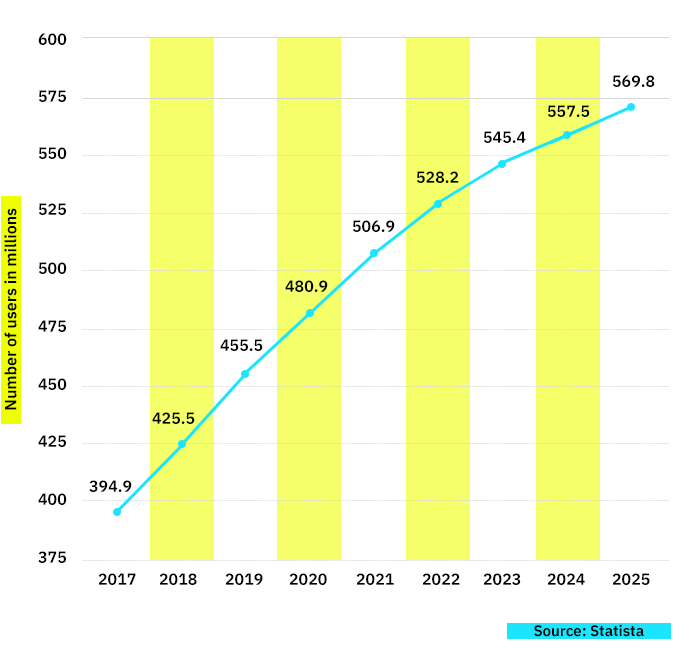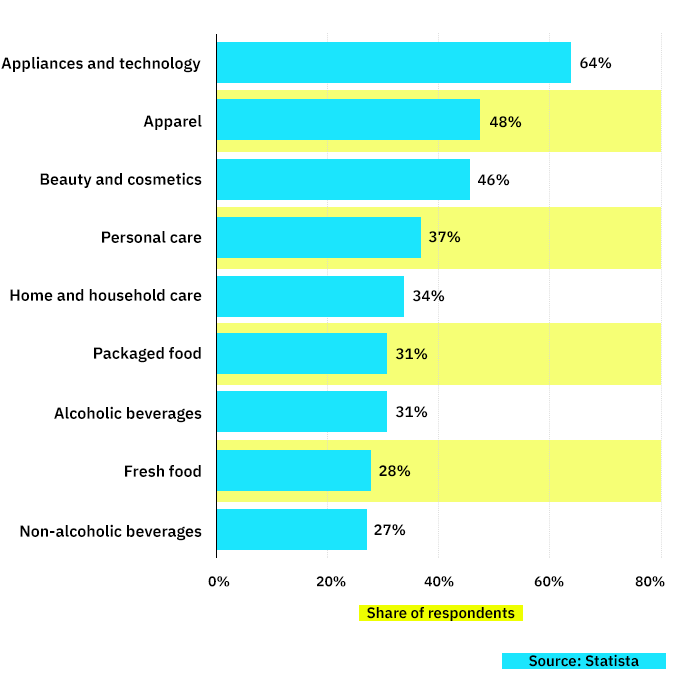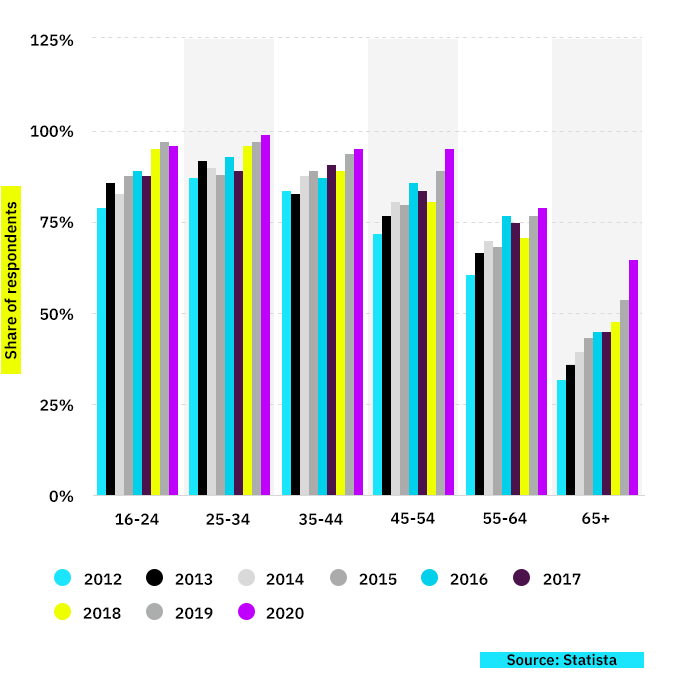What Do British Online Consumers Expect from Their Favourite Brands and Retailers?

A recent study found that 70% of UK shoppers now favour online or mobile shopping over in-store shopping. This has been greatly influenced by the pandemic, with more than half stating that their online shopping had increased since the start of the pandemic. So, with the rapid changes of buying habits that are being experienced in the UK, what are the shopping preferences of British consumers? Who are the major online shoppers in the UK? Which online shopping behaviour differences can we see between Generation Z vs older generations? This article will explore these topics in greater detail, providing you with key insights into your potential consumer base if you are an online retailer looking to expand into the UK market.
To start with, let us begin building a picture of how the ecommerce landscape has been changing in recent years. The following data shows the number of ecommerce users in Europe from 2017, providing a forecast up until 2025:

As you can see in the graph above, the number of ecommerce users in Europe has been steadily growing since 2017, and is expected to continue on this trajectory until 2025. Interestingly enough, it is clear that there was already a strong growth in the number of online shoppers prior to the COVID-19 pandemic, suggesting that the digital shift was already accelerating before lockdowns.
Although it is widely accepted that the pandemic did have an impact on the industry by accelerating a change that was already in force, what will this mean for the future? Is the disparity between consumers shopping online vs in-store likely to continue to grow, even post-covid? The following data looks at the share of consumers in the UK that said they will primarily shop online for selected categories in the future, specifically due to the coronavirus pandemic:

Demonstrated above, you can see that less than half of respondents will primarily shop online as a result of the impact of the coronavirus pandemic for several categories other than appliances and technology. For this category, 64% of consumers said that due to COVID-19, they would primarily shop online in the future. Therefore, the data suggests that the pandemic has not caused a permanent change to consumer behaviour for most categories, but that it has for appliances and technology in particular.
However, it is also important to acknowledge that it could be possible the majority of consumers will primarily shop online for some of those other categories in the future too, but for reasons other than COVID-19, which is what this study in particular was asking about. This would support the hypothesis that there was already a digital shift in motion for other reasons (such as convenience), which was merely accelerated by the pandemic.
A further interesting question that often arises when it comes to consumer behaviour are the differences between generations. We often hear of generation Z, generation X as well as generation Y/millennials. Gen X usually refers to those born between around 1965 and 1980. On the other hand, Gen Y/millennials are usually the following generation, born between around 1981 and 1996. Finally, Gen Z often characterises those born after millennials, somewhere between 1996 and the early 2010s. Since Gen Z are the first generation to have grown up with access to the internet and more portable digital technology, it is possible that their online buying habits will differ to older generations.

The graph above illustrates the share of individuals who made purchases in Britain from 2012 to 2020, by age. As you can see, there is a general trend showing that overall, the older the age group the less they purchased items online, with the 65+ age bracket being the least likely to shop online. In addition, those in the 25-34 age group had the highest online purchasing penetration in 2020 at 99%.
However, it is also interesting to note that over time a higher percentage of every age bracket purchased items online between 2012 and 2020. This is most notable in the 65+ age group, with the number more than doubling from 32% in 2012 to 65% in 2020. Therefore, although your major online shoppers are likely to still be the younger consumers, it appears that older customers are also becoming more comfortable with technology and buying online, meaning an entirely new growing consumer base that your business can target.
Overall, it is abundantly apparent that ecommerce sales and online shopping is constantly on the rise – with the number of users steadily increasing and projected to continue to do so into the future. If you are an online retailer, there are huge opportunities for you to take part in this increased demand, particularly if you offer appliances and technology products which are more sought after as a direct result of the COVID-19 pandemic. But even if your focus is not on those categories, the evidence shows that a larger percentage of every single age group is making purchases across the board online year-on-year. In particular, there is a strong opportunity to tap into the 65+ age range – a consumer base that has more than doubled in size.
With all of this opportunity available, why not work with Arcade to expand your business into the UK and take advantage of the booming market? Many online retailers (particularly in Europe) find it difficult to partner with UK marketplaces for cross-border trade. This is due to a number of factors such as Brexit, which changed a lot of rules around tariffs, taxes and logistics. For a smoother integration where we take care of these issues for you, why not work with Arcade as your merchant of record? At Arcade, we can:
- Facilitate your brand’s cross-border trade strategy in the UK and beyond
- Leverage our relationships with our partners to secure you the best commercial terms
- Use our customer service network to respond to queries in the local language and time zone, taking the stress out of translation
- Design appropriate, localised product listings for your business
- Run local marketing campaigns during peak seasons and shopping events throughout the year so that you can be sure your products are reaching customers at the right time
- Handle local fulfillment and local returns of your products, so we can do the majority of the heavy lifting for you in terms of logistics
- Take care of compliance for you, using our existing partnerships and knowledge to ensure that you avoid any unnecessary problems with taxes, tariffs or documentation
Altogether, Arcade can offer your brand unparalleled speed to market, a far smoother transition and more comprehensive support once we help you set everything up. If you’d like to find out more, feel free to get in touch at: https://www.arcade.global/contact-us/


